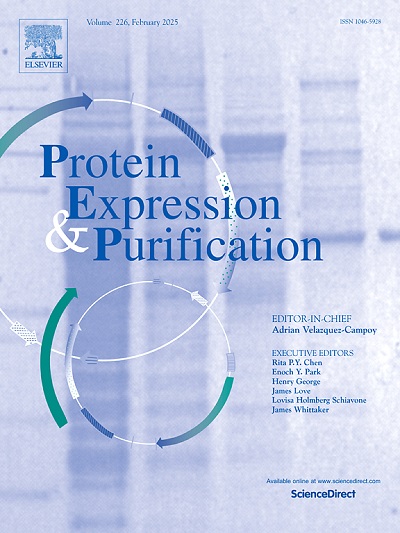靶向EGFR/HER2二聚化域的scFv重组抗体噬菌体的制备及功能分析
IF 1.4
4区 生物学
Q4 BIOCHEMICAL RESEARCH METHODS
引用次数: 0
摘要
背景:肿瘤细胞利用表皮生长因子受体(EGFR)家族对治疗性抗体(如赫赛汀)产生耐药性。在配体结合后,EGFR和HER2之间的二聚化是乳腺癌和其他表达EGFR和HER2的癌症治疗失败的最重要原因之一。本研究的目的是开发和评估人重组单链可变片段(scFv)抗体对EGFR二聚化结构域的功能,以抑制其与表皮生长因子受体家族其他成员,特别是HER2的相互作用。方法:表达和纯化抗EGFR的scFv。对表达EGFR和HER2的细胞系进行细胞elisa、MTT、STAT3磷酸化抑制、定量RT-PCR和二聚化抑制,以表征所产生的scFv的功能特性。计算研究了合成的单链生长因子的构象结构及其与EGFR的结合能力。结果:细胞- elisa体外结合分析显示纯化抗体与EGFR的结合能力,免疫印迹法证实了纯化抗体的结合能力。ScFvs优先降低MCF7、MDA-MB-468和SKOV3细胞系的增殖和存活,对VERO细胞系无影响。更显著的是,scFv抗体处理的MCF7细胞显示STAT3磷酸化降低,Bcl-2表达降低,Bax表达增加。最后,scFvs阻碍了EGFR和HER2的二聚化。结论:所制备的scFv抗体显示出同时阻断EGFR和HER2的功能,表明其有潜力成为靶向治疗各种EGFR过表达肿瘤的有希望的候选物。本文章由计算机程序翻译,如有差异,请以英文原文为准。
Production and functional analysis of a phage displayed scFv recombinant antibody targeting EGFR/HER2 dimerization domain
Background
Tumor cells exploit epidermal growth factor receptor (EGFR) family to develop resistance against therapeutic antibodies, such as Herceptin. Upon ligand binding, dimerization between EGFR and HER2 is one of the most important causes of treatment failure in breast cancer and other cancers expressing EGFR and HER2. The aim of this study was to develop and evaluate the function of a human recombinant single-chain variable fragment (scFv) antibody against the dimerization domain of EGFR to inhibit its interaction with other members of the epidermal growth factor receptor family, especially HER2.
Methods
scFv against EGFR was expressed and purified. Cell-ELISA, MTT assay, inhibition of STAT3 phosphorylation, quantitative RT-PCR, and dimerization inhibition were performed on EGFR and HER2 expressing cell lines to characterize functional properties of the produced scFv. The conformational structure of the produced scFv and its binding ability to EGFR was computationally investigated.
Results
In vitro binding analysis by cell-ELISA revealed the EGFR binding ability of the purified antibodies and confirmed by immunoblotting. ScFvs preferentially reduced the proliferation and survival of MCF7, MDA-MB-468, and SKOV3 cell lines with no effect on the VERO line. More considerably, MCF7 cells treated with the scFv antibody showed reduced STAT3 phosphorylation, decreased Bcl-2 expression, and increased Bax expression. Finally, the scFvs hindered EGFR and HER2 dimerization.
Conclusion
The produced scFv antibody showed to be functional in a simultaneous blockade of EGFR and HER2, suggesting its potential as a promising candidate for targeted therapy against various EGFR overexpressing tumors.
求助全文
通过发布文献求助,成功后即可免费获取论文全文。
去求助
来源期刊

Protein expression and purification
生物-生化研究方法
CiteScore
3.70
自引率
6.20%
发文量
120
审稿时长
32 days
期刊介绍:
Protein Expression and Purification is an international journal providing a forum for the dissemination of new information on protein expression, extraction, purification, characterization, and/or applications using conventional biochemical and/or modern molecular biological approaches and methods, which are of broad interest to the field. The journal does not typically publish repetitive examples of protein expression and purification involving standard, well-established, methods. However, exceptions might include studies on important and/or difficult to express and/or purify proteins and/or studies that include extensive protein characterization, which provide new, previously unpublished information.
 求助内容:
求助内容: 应助结果提醒方式:
应助结果提醒方式:


